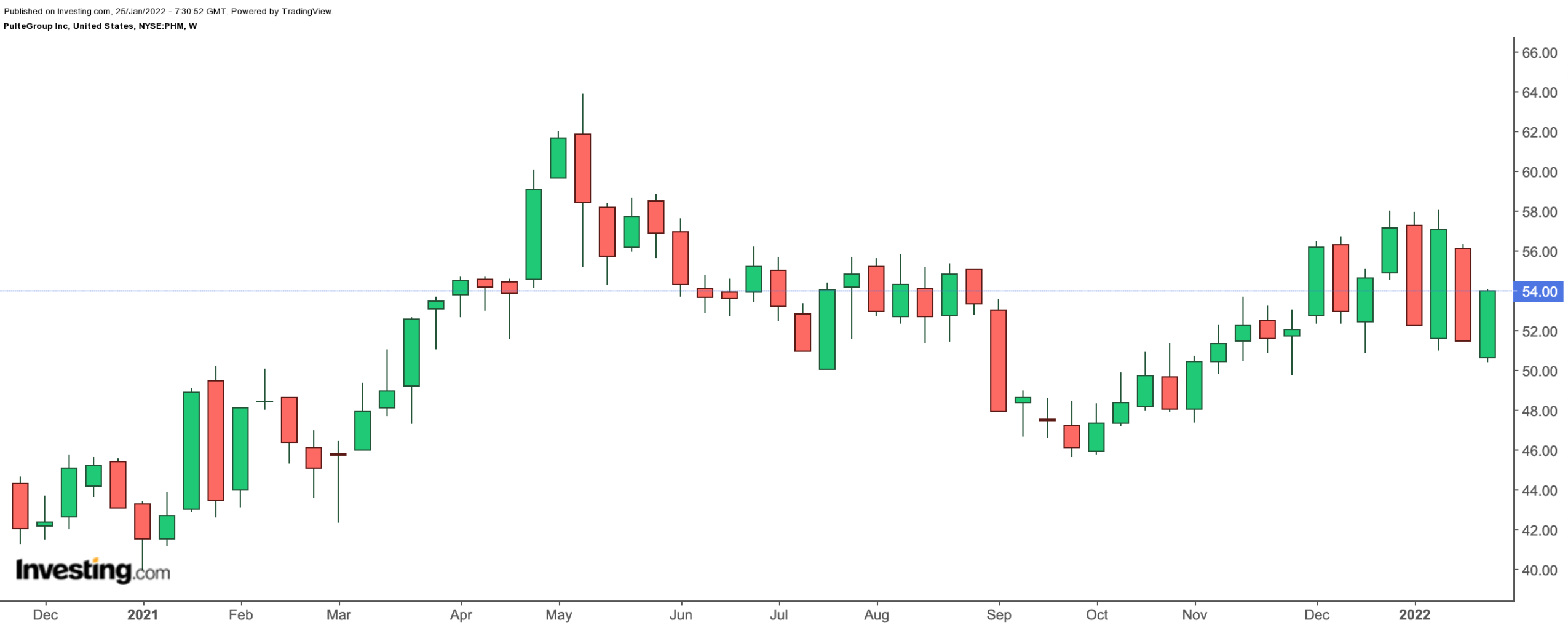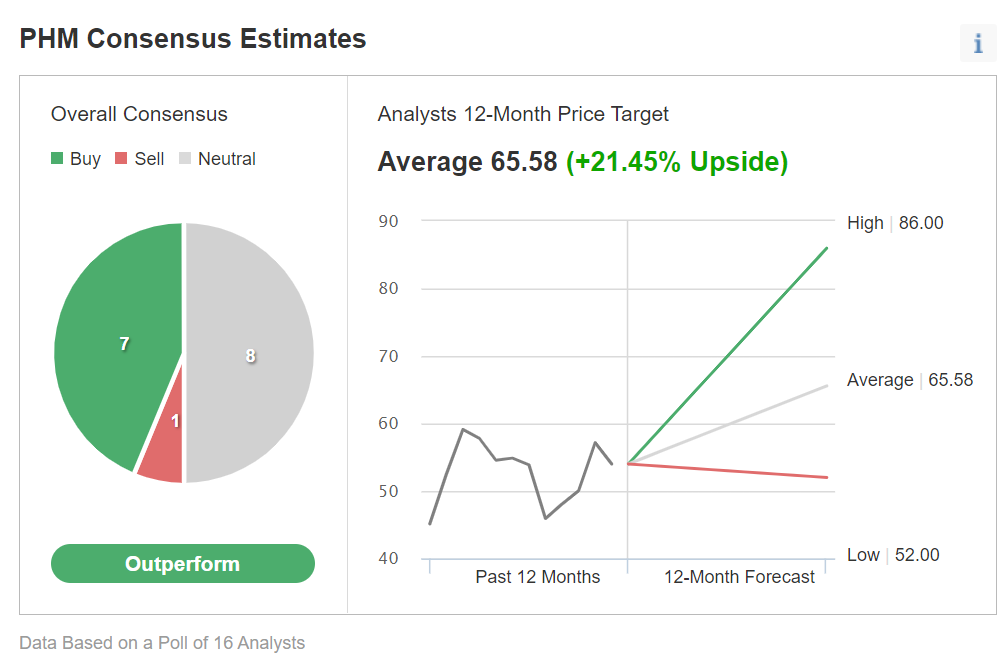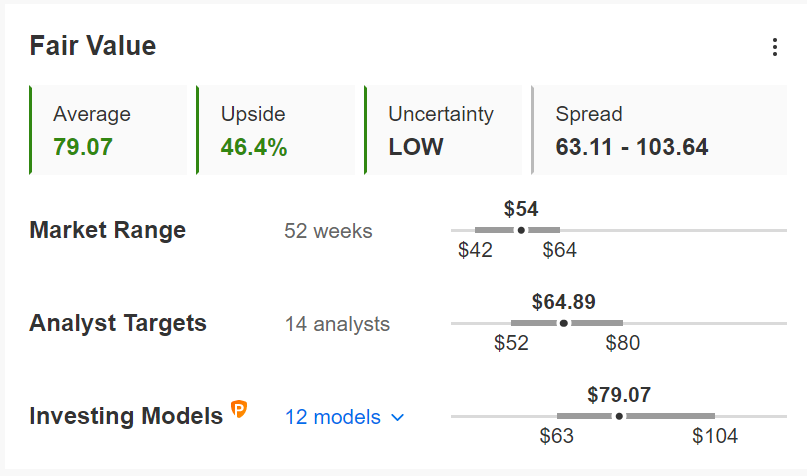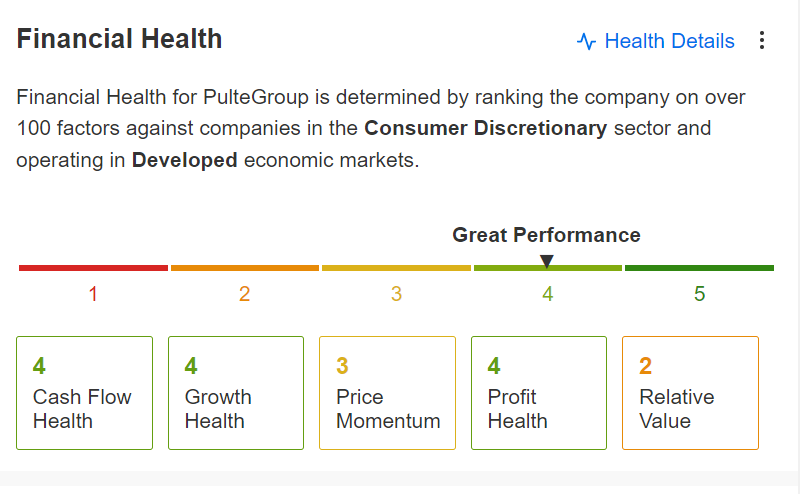- Homebuilding heavyweight PulteGroup’s stock is down over 5% in January.
- Expected interest rate hikes and continued supply chain issues have put pressure on PHM stock as well as its peers.
- Long-term investors could consider investing around current levels.
Shares of homebuilder PulteGroup (NYSE:PHM) have declined 5.5% since the beginning of the year, but still returned 13.4% in the past 52 weeks. In comparison, the Dow Jones US Home Construction Index is up 16.8% in the past 12 months, though it lost over 13.2% in January.

On May 10, PHM shares, which closed yesterday at $54, went over $63 and hit a record high. The stock’s 52-week range has been $42.31 - $63.91, while the market capitalization (cap) stands at $13.7 billion.
Recent metrics released by the US Census Bureau and the Department of Housing and Urban Development show that in December 2021, housing starts hit 1.702 million units—the highest level since March 2021. In December 2020, the number had been 1.661 million units. Meanwhile, building permits also surged 6.5% year-over-year (YoY).
Between 2019 and 2022, the US homebuilding industry grew at a compound annual growth rate (CAGR) of over 4%. Yet, despite the continued optimism for 2022, analysts see headwinds, primarily due to “supply chain disruption and sourcing challenges.”
Analysts are also debating the potential effect of anticipated interest rate hikes on the industry.
By revenue, Atlanta-based PulteGroup is the third largest homebuilder in the US. Other leading names include DR Horton (NYSE:DHI), Lennar (NYSE:LEN), NVR (NYSE:NVR) and Toll Brothers (NYSE:TOL).
PulteGroup announced Q3 figures on Oct. 26. Investors were pleased to see home sale revenues of $3.48 billion, up 18% YoY. Net income of $476 million translated into adjusted earnings per share (EPS) of $1.82. A year ago, its EPS has been $1.34.
During the quarter, net new orders came in at 6,796 homes and were valued at $3.8 billion. Meanwhile, the homebuilder paid $37 million in dividends, and repurchased $261 million of common shares.
On these metrics, CEO Ryan Marshall said:
“Our strong operating results and resulting cash flow also allowed the Company to invest $1.1 billion in land acquisition and development… The housing industry continues to experience robust demand, but significant disruptions in the manufacture and supply of many building products are extending overall build cycles.”
Prior to the release of its quarterly results, PHM stock was trading around $49. By the end of December, shares were over $58. Yet, on Jan. 24, Pulte stock closed at $54.00. As such the price now supports a dividend yield of over 1.1%.
What To Expect From PulteGroup Stock
Among 16 analysts polled via Investing.com, PHM stock has an “outperform" rating.

Chart: Investing.com
Analysts also have a 12-month median price target of $65.58 for the stock, implying an increase of about 21% from current levels. The 12-month price range currently stands between $52 and $86.
Similarly, according to a number of valuation models, like those that might consider P/E or P/S multiples, dividends or terminal values, the average fair value for PHM stock via InvestingPro stands at $79.07.

Source: InvestingPro
In other words, fundamental valuation suggests shares could increase around 46%.
As well, we can look at PulteGroup’s financial health as determined by ranking more than 100 factors against peers in the consumer discretionary sector. In terms of cash flow, growth and profit, it scores 4 out of 5 (top score).

Source: InvestingPro
PHM’s overall performance is rated “great.”
At present, its P/E, P/B and P/S ratios are 8.0x, 1.9x and 1.1x. By comparison, those metrics for its peers stand at 8.5x, 1.6x and 0.7x.
Meanwhile, we can also look at the comparable metrics for other leading homebuilders, including DR Horton, Lennar, NVR, and Toll Brothers. 
As the above numbers show, valuations for homebuilders vary widely. However, compared to a large number of other shares, especially growth names that have reached frothy levels in 2021, these homebuilders mostly offer better value at present.
PulteGroup is expected to issue Q4 earnings on Tuesday, Feb 1, before the open. Therefore, in the coming days, we expect PHM stock to be choppy, and even come under further pressure. Depending on Wall Street's reaction to the numbers, it could potentially slide toward $50 once again. However, we expect a new bull leg higher in Pulte shares to start before long.
Adding PHM Stock To Portfolios
PulteGroup bulls with a two- to three-year horizon who are not concerned about short-term volatility could consider buying into the declines. The target would be $65.58, which is the Investing.com analysts' consensus expectation.
Alternatively, investors could consider buying an exchange traded fund (ETF) that has PHM as a holding. Examples would include:
- iShares US Home Construction ETF (NYSE:ITB)
- The Acquirers Fund ETF (NYSE:ZIG)
- First Trust Rising Dividend Achievers ETF (NASDAQ:RDVY)
- Invesco S&P 500 Equal Weight Consumer Discretionary ETF (NYSE:RCD)
Finally, investors who believe PulteGroup stock could continue to increase in value in the early part of the new year might consider selling a cash-secured put option in PHM stock—a strategy we regularly cover. As it involves options, this set-up will not be appropriate for all investors.
Cash-Secured Put Selling
Such a bullish trade could especially appeal to those who want to receive premiums (from put selling) or to possibly own PHM shares for less than their current market price at $54.00.
This strategy may be appropriate when investors are slightly bullish or neutral on Pulte stock at this time. Selling cash-secured put options on PHM would generate income as the seller receives a premium.
For instance, if investors sold the $50 strike put that expires on Apr. 14, they could collect about $2.40 in premium. Therefore, the maximum return for the seller on the day of expiry would be $240, excluding trading commissions and costs, if the option expires worthless.
If the put option is in the money (meaning PHM stock is lower than the strike price of $50) any time before or at expiration on Apr. 14, this put option can be assigned.
The put seller would then be obligated to buy 100 shares of PulteGroup stock at the put option strike price of $50 for a total of $5,000 per contract. In that case, the trader ends up owning PHM stock for $50 per share.
If the put seller gets assigned shares, the maximum risk is similar to that of stock ownership (in other words, the stock could theoretically fall to zero) but is partially offset by the premium received ($240 for 100 shares).
The break-even point for our example is the strike price ($50.00) less the option premium received ($2.40), i.e., $47.60. This is the price at which the seller would start to incur a loss.
Cash-secured put selling is a moderately more conservative strategy than buying shares of a company outright at the current market price. This can be a way to capitalize on any choppiness in PulteGroup stock in the coming weeks, especially around the earnings release.
Investors who end up owning PHM shares as a result of selling puts could further consider setting up covered calls to increase the potential returns on their shares. Thus, selling cash-secured puts could be regarded as the first step in stock ownership.
